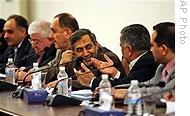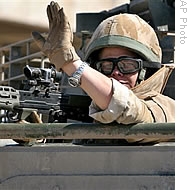voa标准英语2008-Iraqi Parliament Votes to Extend Presence of Non(在线收听)
 |
| Parliament Speaker Mahmoud al-Mashhadani (C) and pol. leaders discuss the security pact in Baghdad, 24 Nov 2008 |
The Iraqi parliament accepted the resignation of its speaker, Mahmoud al-Mashhadani after hours of behind the scenes negotiations and several days of debate. A quick voice vote followed to approve the presence of non-U.S. forces to remain in Iraq until July 31, 2009.
Mashhadani, his voice faltering and several times on the verge of tears, explained that he was resigning in the best interest of the nation after devoting 35 years of his life, many of them in prison and crowned by three years as speaker of parliament, to the service of his country.
He said he played the role of an honest-broker and that he never opened a discussion without seeking consensus, despite harsh words or kind words all at the same time. He concluded that the most important thing is that he leaves with a clear conscience before God, since lofty titles and positions make no difference.
Colleagues of the Sunni politician praised his "devotion to his country," while others thanked him for his "sense of duty and honor" in agreeing to resign.
Following Mashhadani's resignation, the deputy parliament speaker gaveled the session back to order, placing Monday's resolution that non-U.S. foreign forces be allowed to remain in the country until the end of July 2009 back on the table.
 |
| A British army soldier waves from an armored vehicle while on patrol in Basra, southeast of Baghdad (file) |
Members of parliament then quickly voted to approve the resolution, allowing troops from Britain, Australia, Estonia, El Salvador and Romania to remain in the country after the U.N. mandate expires December 31.
The United States and Iraq agreed to a new security pact last month, allowing U.S. troops to remain in the country until 2011.
British Prime Minister Gordon Brown declared last week, during a visit to Baghdad, that his troops would leave Iraq by the end of May 2009. There had been concern that British and other foreign forces would be thrown into a legal limbo if no agreement was reached.